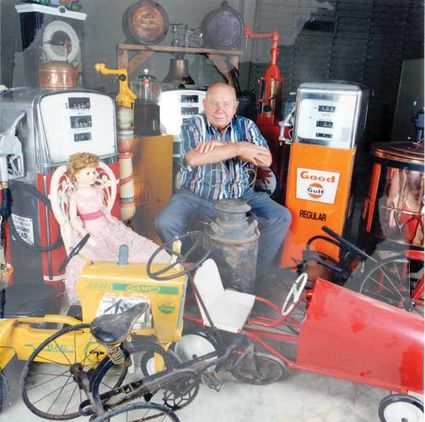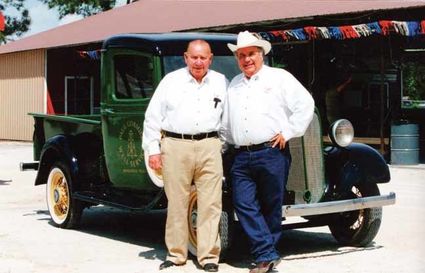Mr. Paul “The Boss” remembered
Last updated 11/4/2009 at Noon
He was a benefactor to a grateful community. Respected by many, he never lost sight of his roots. Paul Cormier, 90, was the last of a breed of independent oilmen who laid their money down, drilled a hole and bet they would hit black gold. Sometimes they didn’t, other times they hit pay dirt. It was all a gamble for the men with the nerves of steel. Mr. Paul, affectionally called “The Boss” by many of us, didn’t come from old money, he came from no money.
Three years after being born in Ged, La., Paul’s family loaded up the house on skids and in four days the mules drug it to the Orange oilfield. The oil boom was on and workers came from around the country. Many slept in tents, others commuted from Orange. The Cormier’s had brought their lodgings with them.
The rest begins a poor boy’s true American success story. Right after completing fifth grade, the only formal education he would have, Paul at 12, in the heart of the Great Depression, left school to help his family survive. His workdays most often amounted to 30 or 40 cents in change. The small money went a long way when a sack of cornmeal sold for a dime, a sack of beans a nickel. Paul worked hard at whatever work he could get. He saved what he could and built a small nest egg.
The major oil companies had come and stripped the fields of its oil or so they thought. Paul had watched and learned the oil industry. He believed the oil companies had left change on the table. He took his savings and what other money he could borrow and bet it all on a workover well. He believed black gold was still plentiful, maybe just at another depth.
Many stories have been written about the Cormier Orangefield success. Over the years, I’ve written several times about the friend and man I respected so much. I gave him his bouquets while he still could read. The rest of this message is on a personal note about a person whose legend will live though time and the history of our area.
It is said that Mr. Paul knew every inch of soil in and around the oilfield but he also knew what was under it at every level, where the salt was, where the sand was and if oil flowed beneath it.
To those who knew and cared for him, he was much more than a successful oilman.
To those who didn’t, he was bigger than life.
A legend they just heard about.
To us he was a caring man who never lost sight of his roots.
He never flaunted his position in life and didn’t allow his family to do so.
He was a compassionate person, a common man with common ways who cared for the people around him.
He was very loyal to his friends and employees.
He not only did a lot for the community he loved, he helped a lot of families who faced what he once had faced.
After I had a degree of success, he was the first person I spoke with.
He was wise about life.
He and my father Clay, who had a six-grade education, had common sense knowledge learned from a poor background and work and an education about life that exceeds college degrees.
Paul was never personally extravagant although he could afford anything in life that anyone would have wanted. He knew he was fortunate and thankful for it. A privilege he allowed himself was the buying of toys and collectibles that he never could have as a boy. He gathered enough to fill two large buildings and become a museum that recently was donated to the school district he supported for years. If you were to have met Mr. Paul anywhere for the first time, with his pants tucked in his boots, you might figure him to have a few cows on a little place in the country somewhere.
After a group of us purchased some land in Bridge City it was decided we would build a community center. Paul wanted it to benefit both Bridge City and Orangefield. His loyalties showed when he wanted to name the adult softball field next to it after his friend Commissioner Asa Manfield. The commissioner had helped us with the development of Parkside Place that now houses the Little League Park, library, senior citizen center, city park etc. Paul had a strong desire to bring the two communities together thus we also started the Bridge City/Orangefield Crawfish and Crab Festival.
At one time, he could visualize a merging of the school districts. He and Bobby both felt what was good for one community would be beneficial for the other. Things fell apart like they so often do when politics got involved. However, Paul and his partner Tim Edgar, bought up much of the land available around Bridge City and Paul started a career in land development. They named their first subdivision Bridgefield for the two communities. He once told me the day would come when the OISD would out number the BCISD in enrollment. It might but it will be a while yet.
A few years ago, I had spoken with him when we came up with the idea to have a Bayou Bowl to be held between the two schools. I wanted to get his idea. He though it would be a good thing. He always believed in anything that brought Orangefield School District publicity. It seems ironic now that he died on Bayou Bowl Day, Oct. 30, the year’s biggest event in both communities.
Services were Tuesday. I will never forget him and his example of principle, doing what’s right to others. The Jewel and Paul Cormier offspring, Bobby and his twin sisters Carlene and Darlene and their families are part of a heritage that exemplifies good will, with a common touch.
It’s my honor to have traveled Down Life’s Highway with this caring, loyal friend. My wish and proposal is that at least part of Farm Road 105, that runs through Orangefield or FM 408, that connects the two communities, be named the Paul Cormier Highway in honor of this great benefactor.
















Reader Comments(0)